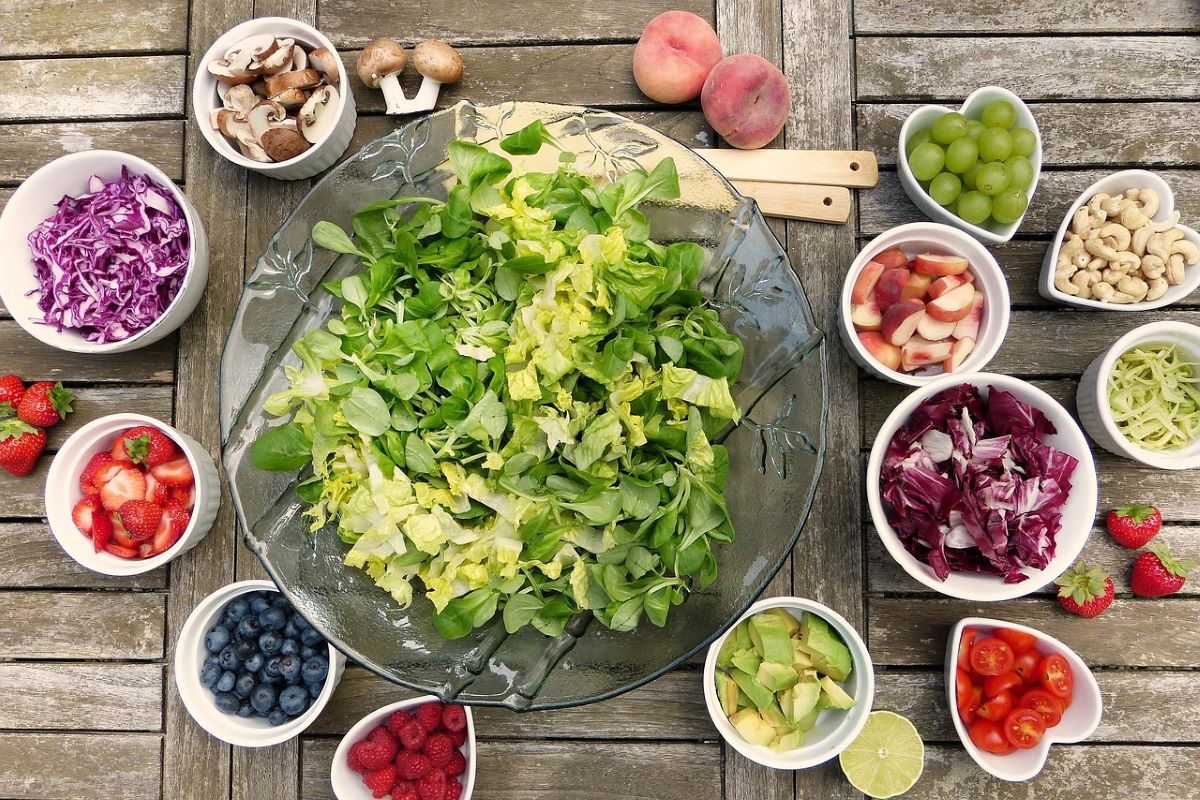Fruits and vegetables are both a good source of vitamins, minerals, and fiber. But there are also some important differences between the two.
Fruits contain seeds—and usually have a sweet taste. Vegetables don’t have seeds and tend to be less sweet.
While most fruits are higher in sugar than vegetables, you can still eat both without worrying about weight gain or tooth decay. The trick is to eat them in moderation and make sure you’re getting plenty of nutrients from other sources as well.
When it comes to nutrition, there’s no difference between fresh or frozen fruits and vegetables—but canned products tend to have added sodium so they shouldn’t be eaten regularly.
What Are Classified As Fruits?
Apart from asking what’s the difference between fruits and vegetables, people also ask what fruits are. Fruits are the fleshy, seed-containing parts of plants that can be eaten. They are classified as being either a simple fruit or a compound fruit. Simple fruits are formed from one ovary and include berries, drupes, and pomes. A compound fruit is formed from multiple ovaries and includes aggregate fruits (such as citrus) and accessory fruits (such as bananas).
What Are Classified As Vegetables?
Vegetables are foods that come from plants and have been eaten since ancient times. Although some vegetables, such as potatoes and carrots, can be eaten raw, most are cooked before eating. Vegetables are usually low in calories but high in vitamins and minerals.
Vegetables are available fresh or frozen all year round. They can also be canned or preserved by freezing for later use. Vegetables are often categorized into two groups: starchy vegetables and non-starchy vegetables. Starchy vegetables include sweet potatoes, peas, corn, winter squash, and green beans; non-starchy vegetables include spinach, broccoli, lettuce, peppers, cauliflower and more.
In addition to being a significant source of vitamins A and C (especially when eaten raw), many vegetables contain other nutrients such as folate (folic acid), potassium, fiber and phytochemicals (substances that may help reduce your risk of certain diseases).
Which Fruits Are Often Mistaken for Vegetables?
For people who don’t know what’s the difference between fruits and vegetables often mistake some fruits for vegetables. These include tomatoes, avocados, and cucumbers.
Tomatoes are actually a fruit, but they are often used as a vegetable in cooking; they are related to potatoes and eggplants, but they can grow on their own roots. Tomatoes have a soft skin and fleshy pulp that surrounds their seeds. They also contain some sugar.
Avocados are actually considered a berry because they have a seed inside that is covered by a hard shell. Avocados are members of the pear family and come from Central America and Mexico. They can be eaten raw or cooked into sauces and other dishes, like guacamole.
Cucumbers are actually fruit too; they belong to the gourd family along with squashes and melons. Cucumbers have a waxy skin that’s easy to peel off after cutting them open lengthwise down one side with a sharp knife (just make sure you wash them first).
Which Vegetables Have A Sweet Flavor?
There are many vegetables that have a sweet flavor, but the most common are corn, peas, and sweet potatoes. Some other vegetables that have a sweet flavor include beets, carrots, pumpkin, summer squash and winter squash.
Corn is an important vegetable because it is used to make popcorn. Popcorn is popular in movie theaters because it is easy to eat and does not leave crumbs on the floor like other snacks do. Corn can also be made into flour which is used in baking breads and cakes.
Peas are a type of legume which means they grow in pods attached to their stems. Peas are often eaten fresh or frozen but they can also be dried or canned for future use when they are not available fresh from the garden or farmer’s market.
What Are The Benefits Of Consuming Fruits?
There are many benefits of consuming fruits. Fruits are a great source of vitamins and minerals, which are essential for your body’s health. They also contain antioxidants that help fight free radicals, which can damage cells in your body.
Fruits contain fiber, which helps your digestive system stay healthy and also makes you feel full longer. They also have water content, so they’re not only good for your body but also for your skin! Depending on the type of fruit, they can even help lower blood pressure or cholesterol levels.
What Are The Benefits Of Consuming Vegetables?
Consuming vegetables is one of the best things you can do for your body. Vegetables are packed with nutrients, vitamins, and minerals that help keep your body in working order.
Here are some of the most important benefits of consuming vegetables:
Vegetables are packed with nutrients.
Vegetables are a great source of vitamins A, C, K and B6 as well as folate, potassium and magnesium. They also contain phytonutrients like lycopene and lutein which protect against certain cancers and heart disease.
Vegetables provide fiber for digestive health.
Fiber is important for digestive health because it helps to keep the colon healthy by promoting regularity in bowel movements and preventing constipation. Fiber also slows down the rate at which sugar is absorbed into the bloodstream so that you don’t experience sudden spikes in blood sugar levels after eating sugary foods or drinking sweetened beverages like soda or juice drinks that contain added sugars such as high fructose corn syrup or cane sugar syrup (which can be found on nutrition labels).
Which Is More Nutritious Fruits Or Vegetables?
Fruits and vegetables are both nutritious, but they’re not always equally so. For example, if you’re looking for fiber in your diet, fruits are a better bet than vegetables. But when it comes to vitamin C? Vegetables win that battle hands down.
If you’re trying to gain weight without adding sugar or salt to your diet, try eating more fruits. But if you’re interested in getting protein into your diet without meat (or even dairy), then go for the veggies!
Conclusion
Overall, we must keep in mind that fruits and vegetables are essential to our health. They provide us with different kinds of nutrients that we need especially in vegetable-abundant countries like Singapore or the United States where a typical meal can be composed of at least two servings of rice, meat and other high calorie food. Vegetables can contribute at least one third of your total food energy intake per day if you rarely eat carbohydrates for dinner. On the other end, fruits make a delicious alternative for desserts!
You May Like These Articles As Well:
 Being Human
Being Human




